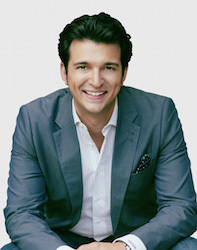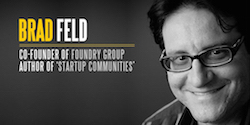Beth Buelow's Blog, page 11
April 15, 2015
Ep79: Keys to a Successful Product Launch with Betsy Talbot
 How does a solitude-loving introvert launch a new product? And what if that product is in a new-to-her category that requires vulnerability and high creativity?
How does a solitude-loving introvert launch a new product? And what if that product is in a new-to-her category that requires vulnerability and high creativity?
That’s the place Betsy Talbot found herself when she accepted the challenge to write her first romance novel. She committed to not only writing the first novel, but quickly found that she had a series on her hands! I met Betsy about five years ago, just before she left Seattle with her husband to embark on a world traveling adventure. Even though our introduction was brief, I was instantly inspired by her energy and go-for-it attitude. So it’s with great pleasure that I welcome her to the podcast for a conversation about the latest twist in her entrepreneurial journey.
Betsy Talbot is a 40-something traveler and author. When she’s not traveling or penning books about love, adventure, and self-discovery, she is hiking, learning flamenco dancing, and drinking wine in a tiny whitewashed village in Spain.
Betsy is the coauthor of four books with her husband Warren Talbot, and they also co-hosts of the popular weekly podcast, Married with Luggage. (side note: I interviewed Betsy and Warren together in 2014 – it’s
April 6, 2015
Are You Establishing Boundaries or Erecting Walls?
Why does stock photography frequently depict an introvert as hiding behind something? They show us with bags over our heads, peeking out from behind curtains or doors, or covering our eyes and turning our faces away.

Stock photo results from a search for “introvert.” Seriously.
These images play to the stereotype that introverts prefer not to be seen or heard, or that we’re timid, nervous types.
As with most stereotypes, there’s at least a grain of truth. But that truth is far afield from what most people assume.
I was recently in New York City and had the opportunity to spend an afternoon alone at the Museum of Modern Art. To my delight, photography was permitted. So I set about visiting my must-see pieces, iPhone at the ready. It was amazing!
But at some point, I realized that I was spending more time trying to get a good picture (and wishing people would get out of my way!) than I was looking at the actual work of art. So I set an intention to stop putting the phone in between me and the masterpieces and focus on being fully present – to the art, to the people around me, and to the entire experience.
How does this connect to introverts hiding? We think that the stereotypical image of introverts hiding is about withdrawing, being anti-social, or being shy. But I think if there’s any truth in it, it’s more about the need for introverts to create boundaries in order to protect their energy. We might “hide” in order to put a bit of energetic distance between ourselves and the environment. It could keep us from being overwhelmed by giving us something to focus on (I think that was part of my iPhone fixation at the museum, in addition to just wanting to remember which pieces really grabbed me). This might look like taking on the role of photographer at the party, being engrossed with our phones while we wait in line, or even taking furious notes at the team meeting.
These activities serve a dual purpose: they give us a useful task while keeping us from draining too much energy. But what I learned at the museum is that if we’re not thoughtful about it, the task becomes less of a boundary and more of a wall. It doesn’t protect us; it cuts us off.
It is possible to establish boundaries without erecting walls. Boundaries allow people to feel your presence more, without requiring you to expend a lot of energy. Walls isolate us and prevent us from experiencing the social interaction that even introverts need in regular (albeit small) doses.
It might sound simplistic, but I’m convinced it’s a matter of mindset more than trying to do something differently. You can still use your phone, take notes, or wear your headphones. Use them as a way to anchor yourself. Every once in a while, look up, make eye contact, smile, ask a question or engage in a moment of small talk (which is sometimes painful, I know! Try accepting it for what it is – small – and release expectations that it has to be anything more). Be aware of your surroundings. Put down the device, take off the headphones, look around, and connect with your environment. Then go back to your anchor, using it as a tool rather than a barrier.
The next time you find yourself in a social or public situation, notice: are you using your camera, phone, notepad, or other device to “hide” or disconnect from others? Or are you using it to create a role for yourself that facilitates engagement or balances your energy? For instance, taking photos makes it easy to mingle, or being the scribe shows participation without being put on the spot.
I won’t deny it: sometimes, we will jump into a task that seems like a socially acceptable way to “hide,” and that’s okay. The point is to be conscious of our choice, and know which choice will serve us best in the moment.
PS: This post is based on a shorter piece I shared in my bi-monthly newsletter. The newsletter includes exclusive content, tips, and resources just for subscribers. Join us! Sign up is at the top of the right column on this page.
[image error]
The post Are You Establishing Boundaries or Erecting Walls? appeared first on Beth Buelow, The Introvert Entrepreneur: Coach, Author, Speaker, Specializing in All Things Introvert.



March 13, 2015
Ep78: How to Procrastinate on Purpose with Rory Vaden
If there’s one thing I hear over and over again from my clients, it’s that they want to overcome procrastination. The web is overflowing with posts, podcasts and X-step programs to fix the procrastination epidemic that’s running rampant.
But what if the answer wasn’t to “fix” it, but to find a way to shift our relationship with it? My guest is Self-Discipline Strategist Rory Vaden. His book Take the Stairs is a #1 Wall St Journal, #1 USA Today, and #2 New York Times bestseller. As an award-winning entrepreneur and business leader, Rory co-founded Southwestern Consulting™ and is founder of The Center for the Study of Self-Discipline (CSSD). His latest book is called Procrastinate on Purpose: 5 Permissions to Multiply Your Time.
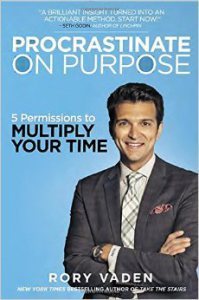 Rory is the world’s leader on defining the psychology around modern-day procrastination, called Priority Dilution™ – in fact, he coined the term. He speaks and consults on how to say no to the things that don’t matter, and yes to the things that do.Rory and I talk about the secrets of time multipliers, getting over introvert overthinking, and making friends with procrastination once and for all.
Rory is the world’s leader on defining the psychology around modern-day procrastination, called Priority Dilution™ – in fact, he coined the term. He speaks and consults on how to say no to the things that don’t matter, and yes to the things that do.Rory and I talk about the secrets of time multipliers, getting over introvert overthinking, and making friends with procrastination once and for all.
Download this episode (right click and save)
Connect with Rory
March 4, 2015
Why Being an Entrepreneur Will Always Take a Back Seat to Being an Introvert

I took this photo and love the way it turned out in the Waterlogue app. It has nothing to do with being an entrepreneur, and I’m good with that.
There are times when, as much as we love our business or our work, that we feel like the wind has gone out of our sails.
It might be caused by a specific incident, or it could be the result of general feelings of fatigue and stress. Whatever it is, the journey feels like a slog.
(Time-out: If reading this feels like a slog, scroll down for the audio version!)
I’ve experienced this at various times during the past seven years, and it’s never fun. It doesn’t cause me to second-guess my path, but it does force the question of what I’m doing—or rather, not doing—to take care of myself.
Last night, I made a simple but profound connection: one of the reasons I love my business name is that it describes both me and the people I serve. And it might seem obvious to say, but in The Introvert Entrepreneur, “Introvert” comes first.
I am an introvert before I’m an entrepreneur. Being an introvert came before entrepreneurship, and it will remain with me when, someday, I move on to a new adventure. Therefore, honoring that part of myself is paramount.
You might say, “Well, isn’t that obvious? Isn’t that what you’ve been talking about for the past five years?”
It is. And, sometimes I forget to practice what I preach!
Here’s what happened: During the last part of February, I had been in a mild funk. Then the fog started to lift, and I was beginning to get some energy back for work, life, everything. Last night, I was on Instagram and noticed there was a cool account called
February 27, 2015
Ep76: Get Big Things Done Through Connectional Intelligence with Erica Dhawan
 Our world is both hyperconnected and disconnected at the same time. How do we make sure we are emphasizing quality connections, instead of just having surface interactions? Erica Dhawan has dedicated herself to researching innovation and how it depends on the connection between people, ideas and things.
Our world is both hyperconnected and disconnected at the same time. How do we make sure we are emphasizing quality connections, instead of just having surface interactions? Erica Dhawan has dedicated herself to researching innovation and how it depends on the connection between people, ideas and things.
She is the co-author, along with Saj-Nicole Joni of the newly released book, Get Big Things Done: The Power of Connectional Intelligence. Adam Grant, Wharton professor and New York Times bestselling author of Give and Take, has said about the book: “Get Big Things Done is a passionate look at a new wave of leaders. It’s full of inspiring stories about imaginative ways to forge meaningful connections and achieve audacious goals.”
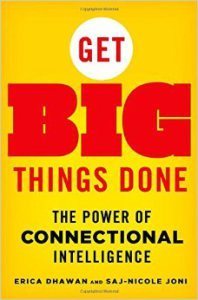 Erica Dhawan is a globally recognized leadership expert and keynote speaker driving innovation across generations and cultures to prepare the global workplace for tomorrow. As one of the today’s most provocative business thinkers, she is CEO of Cotential and has spoken, worldwide, including at the World Economic Forum at Davos. She writes for Forbes, HBR and Fast Company. She has degrees from Harvard, MIT and Wharton.
Erica Dhawan is a globally recognized leadership expert and keynote speaker driving innovation across generations and cultures to prepare the global workplace for tomorrow. As one of the today’s most provocative business thinkers, she is CEO of Cotential and has spoken, worldwide, including at the World Economic Forum at Davos. She writes for Forbes, HBR and Fast Company. She has degrees from Harvard, MIT and Wharton.
Be sure to listen all the way to the end of the interview for a special free offer from Erica that will help you learn more about your own connectional intelligence!
Connect with Erica
February 11, 2015
Ep75: Introverts in Love with Sophia Dembling
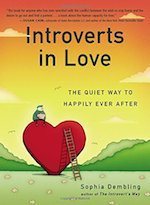 Love it or hate it, it’s that time of year again: Valentine’s Day. This 2015 Valentine’s Day is special, though, because introverts have a new resource to help them navigate the relationship waters.
Love it or hate it, it’s that time of year again: Valentine’s Day. This 2015 Valentine’s Day is special, though, because introverts have a new resource to help them navigate the relationship waters.
January 28, 2015
Ep74: Introverts and The Happy Hour Effect with Kristen Brown
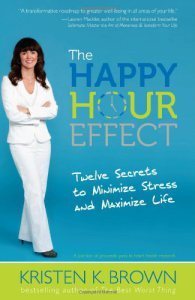 There are few people who would see the terms “introverts” and “happy hour” and think they would be like two peas in a pod. Yet my guest, Kristen Brown, challenges that assumption and gives us a new perspective on happy hour. It’s not about the event itself; it’s about the energy it can generate. Kristen and I chat about “The Happy Hour Effect,” commitments entrepreneurs make that separate a business from a hobby, and the power of our personal story.
There are few people who would see the terms “introverts” and “happy hour” and think they would be like two peas in a pod. Yet my guest, Kristen Brown, challenges that assumption and gives us a new perspective on happy hour. It’s not about the event itself; it’s about the energy it can generate. Kristen and I chat about “The Happy Hour Effect,” commitments entrepreneurs make that separate a business from a hobby, and the power of our personal story.
At the end of my interview, I share a few thoughts that members of
January 22, 2015
The One Phrase You Need to Stop Saying Right Now

Most of us feel like this guy, everyday, all the time.
Please don’t take this the wrong way, but…
I don’t care how busy you are.
I’m busy, you’re busy, we’re all busybusybusy.
So why do we always feel it’s necessary to broadcast our busy-ness to the world?
(Time-out: Did you know this blog post is also in audio format? Scroll down to access the “blogcast” version!)
Let me back up. Over the past few years, I’ve noticed that many of us (including me!) have a conditioned response to the question “How are you?” or “How’s your day going?” It’s often “I’m so busy!” or a variation of that sentiment: “I’m swamped,” “I’m overwhelmed,” “I have too much to do,” and even, “I’m tired”… because I’m so busy.
Recently I had an email exchange with the assistant of an admittedly very busy entrepreneur. Even though she responded “yes” to my request (which was asking for this person’s time), every single email reiterated how busy/swamped/maxed out this person was.
After the fourth time, I actually started talking back to my email inbox: “I know, I get it, you’re important and busy!”
And at that moment, I promised myself I would try to never respond to anything with “I’m so busy.”
It was validating to read about this very point when I picked up a copy of Rory Vaden’s new book, “
January 16, 2015
Ep72: The Authentic Entrepreneur: A Conversation with Brad Feld
One area I’ve not explored very much is raising venture capital. So I’m attempting to remedy that through my conversation with
January 9, 2015
The Key to Entrepreneurial Freedom? Catch and Release

We’re one, but we’re not the same.
We’ve all heard the expression “You are not your job.” It usually makes its way into conversation when we’ve had a stressful day, received criticism, or are just plain tired and afraid our work is consuming us. We feel it’s important to separate ourselves from the work, to remind ourselves that we are not it, and it is not us.
But what if it is?
What if the work is us? What if it’s a business, a book, a piece of art, or a product, that’s completely born out of our hearts and minds? The blood, sweat and tears you shed are a personal reflection of what’s inside of you, not something you can easily separate yourself from on evenings and weekends.
I felt this when I started my business. Since I deliver my coaching services and presentations, write everything myself, and am technically a solopreneur, anything that happened to my business – acceptance, rejection, abundance, scarcity, victory, defeat – happened to me.
In time, I was able to work through that and develop a healthy sense of space between me and my business. It’s been critical for me to remember that my business is about the message of “introvert pride of ownership,” not about me personally. As more people are involved in that message, whether they are clients, colleagues, social media communities, blog readers, or podcast listeners, it becomes less about me and more about the collective.
That said, the challenge of separation between self and business still pops up. Nowhere else has this been more true than around the upcoming publication of my book, “The Introvert Entrepreneur.” It took me a while to sift through the conflicting feelings that vacillated between humbling vulnerability and cautious pride. Then I realized the core conflict:
The book is me. The book is not me.
How to reconcile those two true but seemingly incompatible statements?
In true introvert fashion, I turned those thoughts around in my head for weeks. And I realized that the conflict isn’t only true for me, or for my book. It’s true if you have a business, create music, art or dance, act, or have a child. I’m not a parent, but I can imagine there being a sensation that “The child is me. The child is not me.” You share blood, but you don’t share a body.
Most of my New Year’s Eves for the last seven years have included a visit to St. Mark’s Cathedral in Seattle, spending time walking the labyrinth. Walking and meditating and being in silent communion with others always clears my mind. This year I brought a journal along to capture any a-ha! moments. And the moment came as I wrote out my intentions and old burdens to release to the burning bowl.
There really is no conflict.
The book is me. And, the book is not me.
It contains my blood, but it’s not my body. It’s a separate entity that will have a life of its own. The ideas in the book came through me, not from me. Every word was pulled from somewhere: from clients, colleagues, friends, mentors, coaches. The book doesn’t belong to me, it belongs to you and anyone else reading it. It’s part of my identity, but it’s not my identity.
In the end, we’re inviting people to look not at us, but at our message. They own their response to it. Their response is part of their journey, reflecting something about them and their needs in that moment. It’s not about me or you or what we’ve said or done.
It’s liberating to realize that we don’t own (nor do we have any control over) others’ reactions. That liberation allows us to be proud of what we’ve produced without being attached to how people will respond to it.
Here’s how I invite you to see it in your own life: there’s a phrase in fishing, “catch and release.” I’ve always thought the concept had an application to entrepreneurship – and life – but wasn’t clear on how the dots connected until New Year’s Eve. Here’s where I landed: We can gently catch what comes to us and through us, and then we can release it out into the world to let it do its thing. We can receive the ideas, the inspiration, the words, the praise, the criticism, and once we’ve gotten what we need or want from it, we can release it all back to its source.
Doesn’t that feel lighter? More spacious? More forgiving?
It sounds good in theory, but how will it feel in practice? Challenging, I’m sure. In fact, I can almost promise that a healthy “catch and release” approach will take work. But in the end, it’s worth the effort. Each time you successfully release, you’ll move closer to what author

